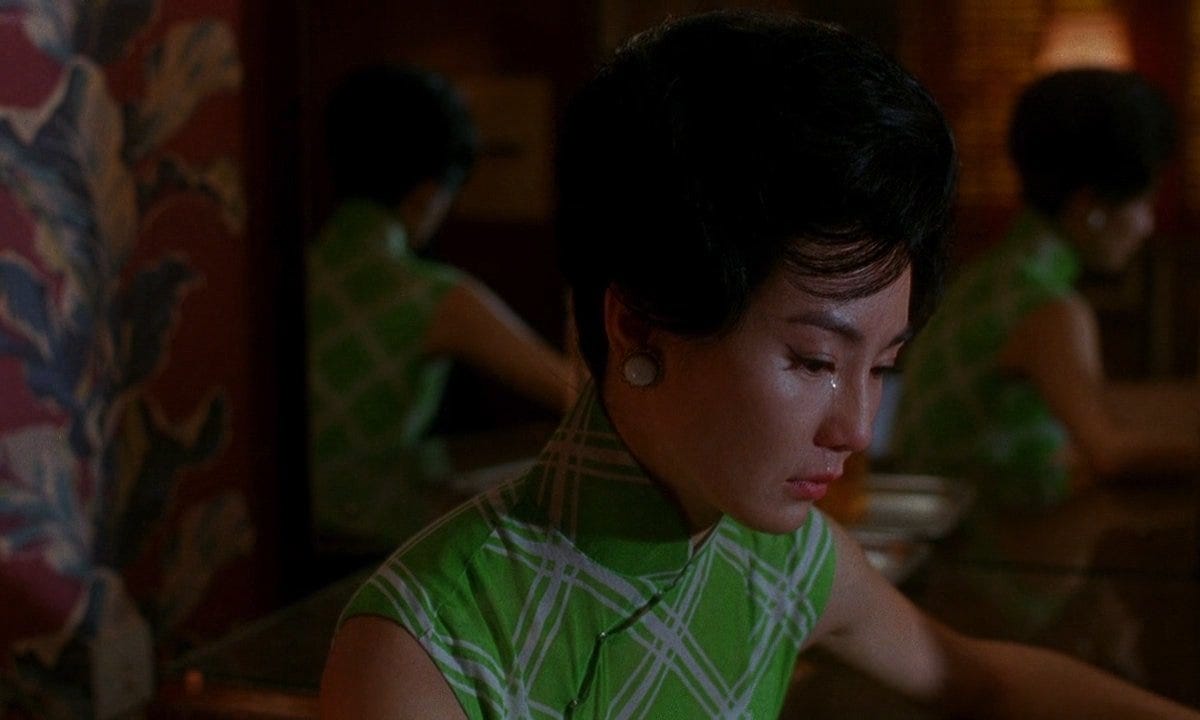In the Mood for Love is about 2 neighbours, a man (Tony Leung) and a woman (Maggie Cheung), who seek comfort in each other after figuring out that his wife and her husband are having an affair with each other, and they themselves also fall in love.

It is, without doubt, very beautifully filmed—Maggie Cheung has never been more elegant, and the film makes great use of colours and shadows. I also like Wong Kar-wai’s use of space—the relationship is impossible in such a small, cramped space, where there is no privacy and no freedom; at the same time, in the building, the characters are usually separated by walls or contained within a door or window, just as they’re restricted by boundaries and social rules.
With Wong Kar-wai, style and mood come before story and characters. In the Mood for Love is not about what the characters do, because they don’t actually do anything; it is not about an affair, because there is no affair, or at least it is unconsummated. It is about the feeling of love, about the characters’ hesitation and inability to face reality or to live for their passion, about longing and loss and regret. The strength of the film is in the performances of Tony Leung and Maggie Cheung, and in the subtleties—the hints and hopeless lies, the things unsaid, the characters’ longing and reluctance, the rehearsals, and so on. There are some wonderful moments.

However, my problem with the film is that in it, style and mood come before everything else. The lack of action is fine, the slowness is not an issue, but the repetitive use of slow-motion—people walking in slow-motion, passing by each other in slow-motion, smoking in slow-motion, etc., which is always accompanied by music, becomes dreary and forced after a while. The overuse of music is another thing that, frankly, gets on my nerves. There is nothing wrong with Wong Kar-wai’s choice of music, but over the past 2 years, I have learnt to embrace silence and taken an interest in sound, and come to dislike unnecessary and manipulative film music, the kind that is meant to manipulate the audience to feel certain things. If you pay attention to sound, In the Mood for Love has either dialogue, or music (I’m talking about non-diegetic music). If there is silence, it is in the pauses in a conversation; otherwise, the film is drowned in music—in the montage, in the establishing shots, in the alone shots… In some scenes, the characters are talking, then as one walks away, the music starts, as though a cue to the audience to realise it’s a sad scene. Several times the music just starts off at an emotional moment, right after an important dialogue. The most annoying scene is perhaps when Tony Leung’s character picks up the phone and says “Hello?” a few times and gets no reply, followed by a shot of Maggie Cheung at the other end of the line, uncertain, reluctant to speak, and the music starts. It is forced, and false.
In the Mood for Love, this time, no longer moves me. It leaves me cold, if not even a bit annoyed.
Wong Kar-wai, as people say, is a true auteur. That sometimes is a bad thing.
over here, there's a related sort of music called "elevator" music... it's supposed to cheer people up, but often is quite depressing... what i get from your post is the difference between forcing watchers into a given mood, versus using music as an enhancer... timing of the effects would seem to be everything, and to be pretty difficult: one of those things that one is aware immediately when it's not working and only works when it's not obvious...
ReplyDeleteYeah that's what I mean.
DeleteIt's just that several times in the film there was dialogue, then suddenly all noise seemed to be cut off and was replaced with music, or music's used for some melancholy slow-motion scenes, so it just annoyed me.
At last year's film festival in Lyon, three thousand people watched this film in the Halle Tony Garnier. Amazing. Wong Kar-Wai was one of the guests of honor. Of course, we were in the home of auteurism.
ReplyDeleteI missed that but did see a beautiful, absurd kung fu movie, The Grandmaster.
I used to have a Wong Kar-war phase, but now may watch again a few of his films to see if I still like him.
DeleteHaven't seen The Grandmaster.
You like In the Mood for Love then?
The Grandmaster is the only Wong Kar-Wai movie I have seen. I read about the big In the Mood for Love screening in the newspaper. In France, culture is news.
DeleteI see.
DeleteAnd yeah, I'm aware.
From what I've seen (8 out of 10), Wong Kar-wai can make 1 specific kind of film. When it's another genre, like As Tears Go By or Ashes of Time, or in another setting, like My Blueberry Nights, he fails completely.
So I expect The Grandmaster to be among his weaker films.